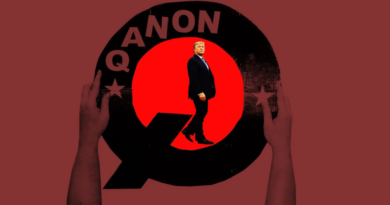Trump’s battle with COVID-19 is fueling a fresh misinformation frenzy

With the president hospitalized, his doctors evading basic questions and an election 29 days away, chaos reigned after Trump tested positive for the virus that’s killed more than 200,000 Americans. Now, after a four-day stay at Walter Reed medical center, the president said he will return to the White House. But more questions than answers remain.
Unlike a normal residence, the White House has its own medical unit, offering “full-time” care and facilities for emergency surgery, including the ability to administer supplemental oxygen — which he previously received at the White House — and even a crash cart for resuscitation.
If the president leaves the hospital Monday evening, the situation could become even more opaque. Trump is eager to return to an image of normalcy, but he’s still a high risk patient in the throes of a wildly unpredictable and deadly virus that seldom charts a linear course to recovery. And because it’s clear that Trump is eager to feign normalcy at any cost with less than a month to go before the election, his return to the White House is not a reliable sign that he’s anywhere near being in the clear.
One result of obfuscating the president’s health? The internet is left to eagerly fill in the gaps.
Top-down misinformation
Doctors provided the first update about the status of Trump’s health on Saturday, but that event backfired, with White House Physician Dr. Sean Conley later admitting that he omitted information in order to keep the president’s spirits high. Conley also threw the timeline of Trump’s diagnosis into question — confusion that’s only been partially resolved since.
The White House’s coronavirus outbreak is a big opening for opportunists, according to Yonder, an AI company that monitors online conversations and tracks disinformation. In an online info ecosystem the company says is “broken,” a fresh crisis is rocket fuel for false claims and conspiracies.
“From groups suggesting the diagnosis was a hoax for political gain to QAnon supporters suggesting it was all part of a plan to isolate and protect the President from his adversaries in the ‘deep state,’ social media continues to act as a weaponized rumor mill,” Yonder CEO Jonathon Morgan said.
“In every case, agenda-driven groups on social media are using another national crisis to their advantage, and obscuring the truth in the process.”
On Friday, left-leaning conspiracy theories like #TrumpCovidHoax posited that the president wasn’t actually sick with COVID at all, suggesting he might have been malingering to elicit sympathy or avoid facing off with Joe Biden after a disastrous debate performance just days earlier.
Those beliefs are still rampant on social media even as the White House’s COVID-19 outbreak sidelines Trump’s own press secretary Kayleigh McEnany and campaign manager Bill Stepien, with the chaos threatening to take Trump’s reelection campaign completely off the rails.
‘Dire’ real-world effects
Hubris about the basic facts of the virus is undeniably what got the White House into this mess to begin with. Last week, a study by Cornell University found that President Trump is indeed the nexus of misinformation about the pandemic, with mentions of his name driving 38 percent of the broader COVID-19 misinformation ecosystem.
“The biggest surprise was that the president of the United States was the single largest driver of misinformation around Covid,” the study’s lead author Sarah Evanega said of the results. “That’s concerning in that there are real-world dire health implications.”
Those dire real-world implications took root over the weekend, as the virus threatened the president’s health seriously enough that his treatment team administered at least three powerful experimental treatments: the monoclonal antibody therapy Regeneron, which is still in clinical trials and not broadly available, the antiviral drug Remdesivir and the steroid Dexamethasone, which is prescribed in severe COVID-19 cases.
Hydroxychloroquine isn’t part of that his current drug cocktail, but the unproven COVID treatment the president touted — and took — earlier this year is again making the rounds online among some of the his supporters who are urging doctors to throw it into the mix.
Stella Immanuel, who was central to the “America’s Frontline Doctors” viral video that pushed false claims about COVID-19 treatments earlier this year, tweeted Friday that “Whoever told the president to stop taking HCQ should be punched in the face.”
In July, Trump called Immanuel an “important voice” who had “tremendous success” treating the virus before claiming that he is not familiar with her moments later.
Arizona Rep. Andy Biggs also tweeted his support for Hydroxychloroquine in the president’s treatment, in spite of the fact that the drug has not been shown to effectively fight the virus.
Circles promoting the pervasive pro-Trump conspiracy theory known as QAnon have their own ideas about the president’s condition, even viewing the Trump’s announcement that he had the virus as a “breadcrumb” encoding a secret message about Hillary Clinton. On Friday, 17 Republicans refused to support a bipartisan House measure condemning QAnon.
QAnon supporter DeAnna Lorraine Tesoriero, who ran a failed bid for Congress, suggested that Trump actually contracted the virus from a microphone at Tuesday’s debate rather than from his open disregard for mask-wearing and social distancing, two measures the CDC and global health experts say effectively reduce transmission.
While misinformation is thriving in the absence of answers about the president’s health, factual medical advice emerged in at least one place amidst the chaos. After initially publishing — and then removing — facts about airborne transmission of the virus, the CDC added that information back to its website on Monday.
According to the CDC’s new guidance, which reflects scientific consensus, the virus can linger in the air for “minutes to hours” and infect people more than six feet away.
*** This article has been archived for your research. The original version from TechCrunch can be found here ***


